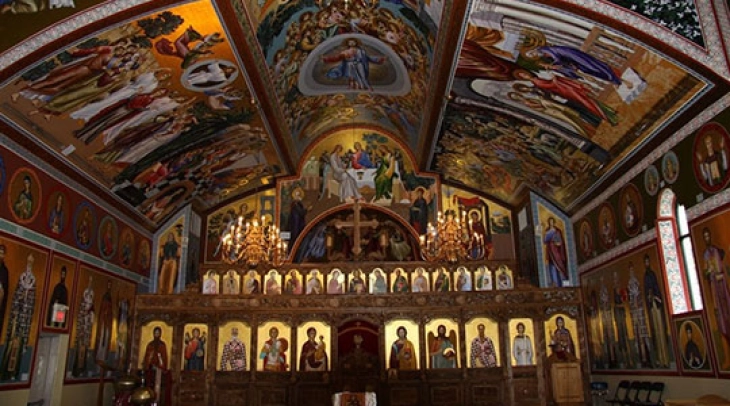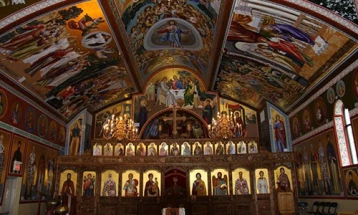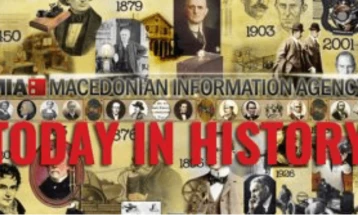Religious calendars
- Saint Basil was born in Popovo Polje, a village in Herzegovina, of simple and God-fearing parents.
- Post By Angel Dimoski
- 08:43, 12 May, 2023

12 May 2023 (MIA)
Macedonian Orthodox Church Calendar
St Basil of Ostrog, Wonderworker
Saint Basil was born in Popovo Polje, a village in Herzegovina, of simple and God-fearing parents. From his youth he was filled with love for the Church of God and when he reached maturity he entered the monastery of the Dormition of the Most Holy Theotokos in Trebinje and there received the monastic tonsure. As a monk he quickly became renowned because of his genuine and infrequently-found ascetic life. Saint Basil took upon himself mortification upon mortification, each one heavier and more difficult than the last. Later, against his will he was elected and consecrated as bishop of Zahumlje and Skenderija. As a hierarch he first lived in the monastery of Tvrdosh and from there, as a good shepherd, he strengthened his flock in the Orthodox Faith, protecting them from the cruelty of the Turks and the cunning ways of Latins. When Basil was exceedingly pressed by his enemies and Tvrdosh destroyed by the Turks, he moved to Ostrog, where he lived an austere ascetic life, protecting his flock by his ceaseless and fervent prayer. He fell asleep peacefully in Lord in the sixteenth century, leaving behind his incorrupt Relics, incorrupt and miracle working to the present day. The miracles at the grave of Saint Basil are without number. Christians and Muslims alike come before his Relics and find healing for their gravest illnesses and afflictions. A great people’s assembly (sabor) occurs there annually on the Feast of Pentecost.
Catholic Calendar
St. Leopold Mandic
Saint Leopold Bogdan Mandic was born on May 12, 1866 and died on June 30, 1942. He was an ethnic Croat born in Herceg Novi, in Boka Kotorska (modern-day Montenegro), and died in Padua, Italy. Physically malformed and delicate, having a height of only 1.35m, with clumsy walk and stuttering, he developed tremendous spiritual strength. His feast is celebrated May 12. Although he wanted to be a missionary in Eastern Europe, he spent almost all of his adult life in Italy, and lived in Padua from 1906 until the end of his life. He also spent one year in Italian prison during WWI, since he did not want to renounce his Croatian nationality. He also dreamed unceasingly about reuniting the Catholic and Orthodox churches and going to the Orient. He became known as Apostle of Confession and Apostle of Unity. He made a famous prayer that is the forerunner of today's Ecumenism. Refusing to renounce his Croatian nationality during World War I, Leopold was forced to go to southern Italy. All this time Leopold held a hope that he would be able to return to his homeland and preach among his people, a feat that would be inhibited by his disabilities. On top of his physical deformities, he also suffered from stomach ailments, poor eyesight, and arthritis. Unsurprisingly, the Capuchin ministers declined these attempts due to his health. Leopold also had a deep devotion to the Virgin Mary who he referred to as "my holy boss". He was known to pray the rosary quite often, and celebrated the Eucharist daily at the side altar in the Little Office of the Virgin Mary. He would then visit the sick in nursing homes, hospitals and homes all over Padua. He visited the Capuchin infirmary to comfort the sick friars, giving them words of advice and reminding them to have faith. Leopold suffered from esophagus cancer, which would ultimately lead to his death at age 76. On July 30, 1942, while preparing for the liturgy, he collapsed on the floor. He was then brought to his cell, where he was given the last rites. Friars that had gathered at his bed sang "Salve Regina," and when they got to the words, "O clement, O loving, O sweet Virgin Mary," Leopold died. During the bombing of World War II the church and part of the friary where Leopold lived were demolished, but Leopold's cell and confessional were left unharmed. Leopold had predicted this before his death, saying, "The church and the friary will be hit by the bombs, but not this little cell. Here God exercised so much mercy for people, it must remain as a monument to God's goodness." Paul VI beatified Leopold on May 2, 1976. He was canonized by John Paul II during the Synod of Bishops on October 16, 1983. Leopold is hailed as the "Apostle of Unity."







